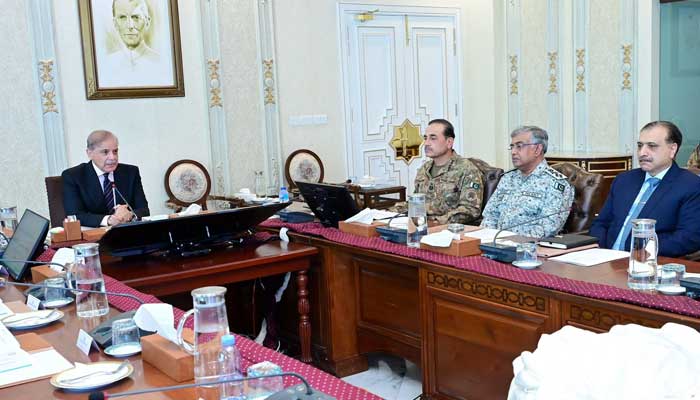Israel's reckless actions against Iran threaten to ignite wider conflict, warns Pakistan's NSC
PM-led huddle calls on parties to urgently de-escalate situation through diplomacy and dialogue
June 23, 2025

- NSC reaffirms Iran's inherent right to self-defence.
- Expresses concern over strikes on Iranian nuclear sites.
- Reaffirms commitment to engage with all parties to promote peace.
ISLAMABAD: The National Security Committee (NSC) has warned that Israel’s "reckless" military actions against Iran have dangerously escalated regional tensions, threatening to spark a wider conflict and undermining prospects for dialogue and diplomacy.
“The Committee reaffirmed Iran's inherent right to self-defence, as enshrined in the United Nations Charter,” read an official statement issued after a high-level meeting chaired by Prime Minister Shehbaz Sharif to review the evolving regional situation.
The NSC strongly condemned the Israeli aggression and expressed deep regret that the attacks coincided with a constructive negotiation process between Iran and the United States.
Offering condolences to the government and people of Iran over the loss of innocent lives, the committee expressed serious concern over the strikes on Iranian nuclear sites in Fordow, Natanz, and Isfahan on June 22, which it said violated international law, IAEA resolutions, and the UN Charter.
Reiterating Pakistan’s longstanding stance, the committee called on all relevant parties to urgently de-escalate the situation through diplomacy and dialogue.
The NSC also underscored the importance of adherence to international human rights and humanitarian law, while reaffirming Pakistan’s commitment to actively engage with all parties to promote regional peace and stability.
The meeting comes against the backdrop of an exponential increase in the Middle East turmoil due to Israel's attack on Iran — a situation further exacerbated by the US strikes on Tehran's nuclear facilities.
Since June 13, Israel has launched large-scale strikes on Iran, targeting military bases, nuclear sites and residential areas across the country.
The attacks have killed at least 950 people in the Islamic Republic, including top military commanders, nuclear scientists and civilians.
Iran has retaliated with barrages of drones and missiles that have killed at least 24 people in Israel, according to the figures from the prime minister's office.
Iran does not recognise Israel and has long accused it of carrying out sabotage operations against its nuclear facilities, as well as assassinating its scientists.
Earlier in the day, Israel struck Evin prison in northern Tehran, a potent symbol of Iran's governing system, in what Israel called its most intense bombing yet of the Iranian capital a day after the United States joined the war.
'Immediate end to Israeli aggression'
Pakistan, China, and Russia have urged an end to the Israeli aggression, proposing the United Nations Security Council adopt a resolution calling for an immediate and unconditional ceasefire in the Middle East.
As the world awaited Iran's response to the US strikes, the UNSC met — a day earlier — to discuss the development on Tehran's request while it rained down missiles on Israel despite Trump's warning of "far greater" consequences if the hostilities don't stop.
China and Russia condemned the US strikes while Pakistan backed Tehran and its right of self-defence, citing violation of international law.
Speaking at the 15-member body, Pakistan's Permanent Representative to the UN Asim Iftikhar said that history reflects that the use of force and unilateral military actions only deepen conflicts and entrench divisions.
"We must act now to prevent the situation from spiralling further out of control [....] Dialogue and diplomacy remain the only viable path forward," Pakistan's Permanent Representative to the UN Asim Iftikhar told the UNSC huddle amid increasingly volatile situation in the region.
Ambassador Iftikhar echoed the earlier statement issued by the Foreign Office condemning US bombings and backing Iran's right of self-defence and lamented the attacks on the nuclear sites as "dangerous precedent and pose a grave threat to the safety and security of populations across the region and the world".
Reiterating Pakistan's support for Iran, the UN representative underscored that the sharp rise in tensions and violence as a result of the Israeli aggression and unlawful actions was profoundly disturbing and "any further escalation risks catastrophic consequences for the region and beyond".











